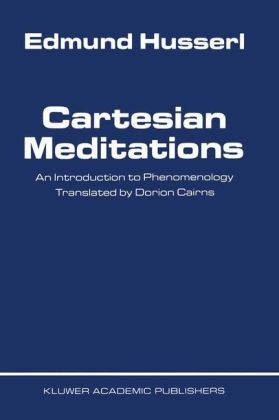Share
Edmund Husserl, Dorion Cairns
Cartesian Meditations 5th Edtion - An Introduction to Phenomenology
English · Paperback / Softback
Description
Inhaltsverzeichnis § 1. Descartes' Meditations as the prototype of philosophical reflection.- § 2. The necessity of a radical new beginning of philosophy.- First Meditation. The Way to the Transcendental Ego.- § 3. The Cartesian overthrow and the guiding final idea of an absolute grounding of science.- § 4. Uncovering the final sense of science by becoming immersed in science qua noematic phenomenon.- § 5. Evidence and the idea of genuine science.- § 6. Differentiations of evidence. The philosophical demand for an evidence that is apodictic and first in itself.- § 7. The evidence for the factual existence of the world not apodictic; its inclusion in the Cartesian overthrow.- § 8. The ego cogito as transcendental subjectivity.- § 9. The range covered by apodictic evidence of the "Iam".- § 10. Digression: Descartes' failure to make the transcendental turn.- § 11. The psychological and the transcendental Ego. The transcendency of the world.- Second Meditation. The Field of Transcendental Experience Laid Open in Respect of its Universal Structures.- § 12. The idea of a transcendental grounding of knowledge.- § 13. Necessity of at first excluding problems relating to the range covered by transcendental knowledge.- § 14. The stream of cogitationes. Cogito and cogitatum.- § 15. Natural and transcendental reflection.- § 16. Digression: Necessary beginning of both transcendental "purely psychological" reflection with the ego cogito.- § 17. The two-sidedness of inquiry into consciousness as an investigation of correlatives. Lines of description. Synthesis as the primal form belonging to consciousness.- § 18. Identification as the fundamental form of synthesis. The all-embracing synthesis of transcendental time.- § 19. Actuality and potentiality of intentional life.- § 20. The peculiar nature of intentional analysis.- § 21. The intentional object as "transcendental clue".- § 22. The idea of the universal unity comprising all objects, and the task of clarifying it constitutionally.- Third Meditation. Constitutional Problems. Truth and Actuality.- § 23. A more pregnant concept of constitution, under the titles "reason" and "unreason".- § 24. Evidence as itself-givenness and the modifications of evidence.- § 25. Actuality and quasi-actuality.- § 26. Actuality as the correlate of evident varification.- § 27. Habitual and potential evidence as functioning constitutively for the sense "existing object".- § 28. Presumptive evidence of world-experience. World as an idea correlative to a perfect experiential evidence.- § 29. Material and formal ontological regions as indexes pointing to transcendental systems of evidence.- Fourth Meditation. Development of the Constitutional Problems Pertaining to the Transcendental Ego Himself.- § 30. The transcendental ego inseparable from the processes making up his life.- § 31. The Ego as identical pole of the subjective processes.- § 32. The Ego as substrate of habitualities.- § 33. The full concretion of the Ego as monad and the problem of his self-constitution.- § 34. A fundamental development of phenomenological method. Transcendental analysis as eidetic.- § 35. Excursus into eidetic internal psychology.- § 36. The transcendental ego as the universe of possible forms of subjective process. The compossibility of subjective processes in coexistence or succession as subject to eidetic laws.- § 37. Time as the universal form of all egological genesis.- § 38. Active and passive genesis.- § 39. Association as a principle of passive genesis.- § 40. Transition to the question of transcendental idealism.- § 41. Genuine phenomenological explication of one's own "ego cogito" as transcendental idealism.- Fifth Meditation. Uncovering of the Sphere of Transcendental Being as Monadological Intersubjectivity.- § 42. Exposition of the problem of experiencing someone else, in rejoinder to the objection that phenomenology entails solipsism.- § 43. The noematic-ontic mode of givenness of the Other, as tra...
Product details
| Authors | Edmund Husserl |
| Assisted by | Dorion Cairns (Editor), Dorion Cairns (Translation) |
| Publisher | Springer International Publishing AG |
| Languages | English |
| Product format | Paperback / Softback |
| Released | 31.07.1977 |
| EAN | 9789024700684 |
| ISBN | 978-90-247-0068-4 |
| Dimensions | 153 mm x 228 mm x 9 mm |
| Subject |
Humanities, art, music
> Religion/theology
|
Customer reviews
No reviews have been written for this item yet. Write the first review and be helpful to other users when they decide on a purchase.
Write a review
Thumbs up or thumbs down? Write your own review.

